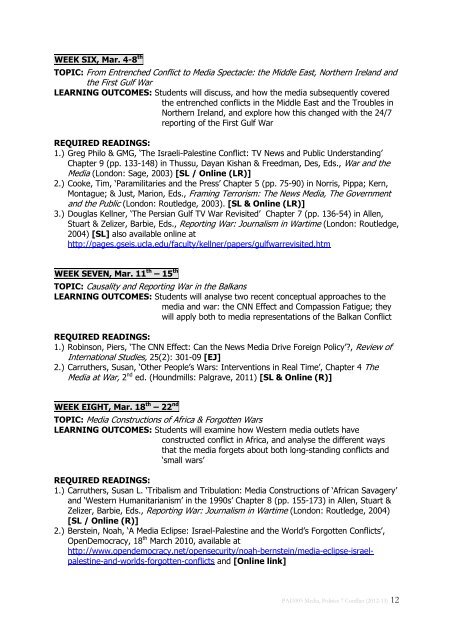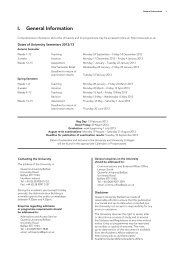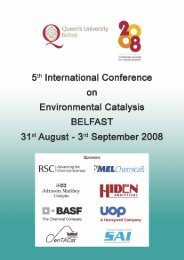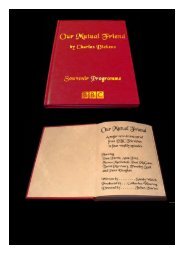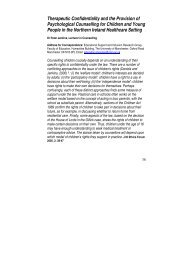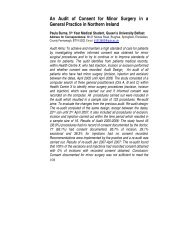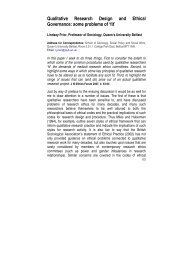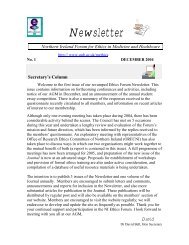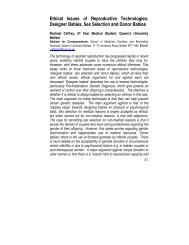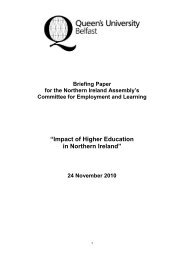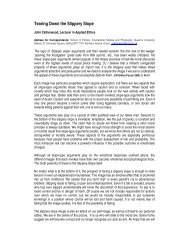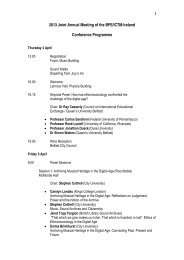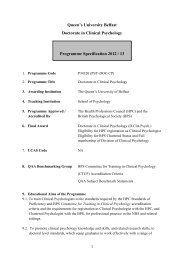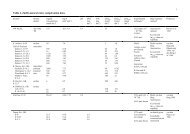Media, Politics & Conflict - Queen's University Belfast
Media, Politics & Conflict - Queen's University Belfast
Media, Politics & Conflict - Queen's University Belfast
You also want an ePaper? Increase the reach of your titles
YUMPU automatically turns print PDFs into web optimized ePapers that Google loves.
WEEK SIX, Mar. 4-8 th<br />
TOPIC: From Entrenched <strong>Conflict</strong> to <strong>Media</strong> Spectacle: the Middle East, Northern Ireland and<br />
the First Gulf War<br />
LEARNING OUTCOMES: Students will discuss, and how the media subsequently covered<br />
the entrenched conflicts in the Middle East and the Troubles in<br />
Northern Ireland, and explore how this changed with the 24/7<br />
reporting of the First Gulf War<br />
REQUIRED READINGS:<br />
1.) Greg Philo & GMG, ‘The Israeli-Palestine <strong>Conflict</strong>: TV News and Public Understanding’<br />
Chapter 9 (pp. 133-148) in Thussu, Dayan Kishan & Freedman, Des, Eds., War and the<br />
<strong>Media</strong> (London: Sage, 2003) [SL / Online (LR)]<br />
2.) Cooke, Tim, ‘Paramilitaries and the Press’ Chapter 5 (pp. 75-90) in Norris, Pippa; Kern,<br />
Montague; & Just, Marion, Eds., Framing Terrorism: The News <strong>Media</strong>, The Government<br />
and the Public (London: Routledge, 2003). [SL & Online (LR)]<br />
3.) Douglas Kellner, ‘The Persian Gulf TV War Revisited’ Chapter 7 (pp. 136-54) in Allen,<br />
Stuart & Zelizer, Barbie, Eds., Reporting War: Journalism in Wartime (London: Routledge,<br />
2004) [SL] also available online at<br />
http://pages.gseis.ucla.edu/faculty/kellner/papers/gulfwarrevisited.htm<br />
WEEK SEVEN, Mar. 11 th – 15 th<br />
TOPIC: Causality and Reporting War in the Balkans<br />
LEARNING OUTCOMES: Students will analyse two recent conceptual approaches to the<br />
media and war: the CNN Effect and Compassion Fatigue; they<br />
will apply both to media representations of the Balkan <strong>Conflict</strong><br />
REQUIRED READINGS:<br />
1.) Robinson, Piers, ‘The CNN Effect: Can the News <strong>Media</strong> Drive Foreign Policy’?, Review of<br />
International Studies, 25(2): 301-09 [EJ]<br />
2.) Carruthers, Susan, ‘Other People’s Wars: Interventions in Real Time’, Chapter 4 The<br />
<strong>Media</strong> at War, 2 nd ed. (Houndmills: Palgrave, 2011) [SL & Online (R)]<br />
WEEK EIGHT, Mar. 18 th – 22 nd<br />
TOPIC: <strong>Media</strong> Constructions of Africa & Forgotten Wars<br />
LEARNING OUTCOMES: Students will examine how Western media outlets have<br />
constructed conflict in Africa, and analyse the different ways<br />
that the media forgets about both long-standing conflicts and<br />
‘small wars’<br />
REQUIRED READINGS:<br />
1.) Carruthers, Susan L. ‘Tribalism and Tribulation: <strong>Media</strong> Constructions of ‘African Savagery’<br />
and ‘Western Humanitarianism’ in the 1990s’ Chapter 8 (pp. 155-173) in Allen, Stuart &<br />
Zelizer, Barbie, Eds., Reporting War: Journalism in Wartime (London: Routledge, 2004)<br />
[SL / Online (R)]<br />
2.) Berstein, Noah, ‘A <strong>Media</strong> Eclipse: Israel-Palestine and the World’s Forgotten <strong>Conflict</strong>s’,<br />
OpenDemocracy, 18 th March 2010, available at<br />
http://www.opendemocracy.net/opensecurity/noah-bernstein/media-eclipse-israelpalestine-and-worlds-forgotten-conflicts<br />
and [Online link]<br />
PAI1005 <strong>Media</strong>, <strong>Politics</strong> 7 <strong>Conflict</strong> (2012-13) 12


